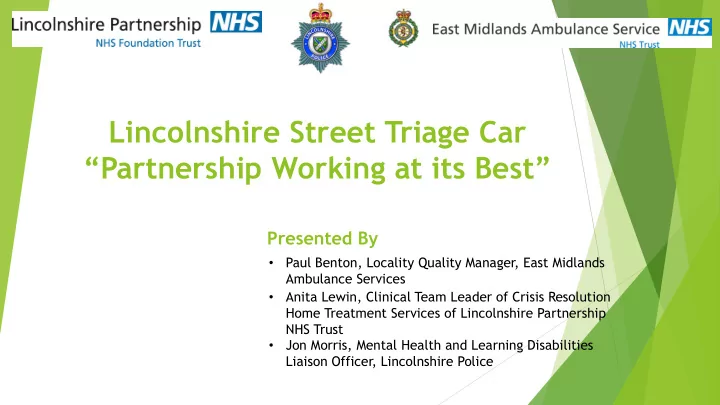

Lincolnshire Street Triage Car “Partnership Working at its Best” Presented By Paul Benton, Locality Quality Manager, East Midlands • Ambulance Services • Anita Lewin, Clinical Team Leader of Crisis Resolution Home Treatment Services of Lincolnshire Partnership NHS Trust Jon Morris, Mental Health and Learning Disabilities • Liaison Officer, Lincolnshire Police
Background Lincolnshire, is the second biggest county in England To be able to provide the highest level of patient care, the need for an urgent response in time of crisis is paramount. Police and Ambulance staff nationally receive limited mental health training throughout their careers. The most probably outcomes for Mental health patients in crisis when seen by EMAS are section 136 and ED attendance. The Mental Health concordat has influenced our operating model.
What is a Tri-Agency Mental Health Triage Car? A car with the specific function of meeting the needs of those in mental health crisis. Supported by three agencies, Ambulance, Mental health and Police Unmarked Car provided by and maintained by EMAS Qualified staff from both EMAS and Local mental health crisis services operate the to ensure a complete physical and mental health assessment is completed combining the expertise of the two health professionals Provides on scene support for Patients, Ambulance staff and Police Provides telephone triage for Ambulance and Police
Current Operating Procedure All call outs are processed through the Lincolnshire Emergency operations centre for EMAS. They respond to 111, 999 and police and ambulance operational requirements. The car is staffed from 16:00 to 00:00 seven days a week and is accessible by EMAS frontline staff and police The car responds to people with mental health or learning disability presentations. The pilot currently works with people aged 18 and over. The car provides assessment and intervention as required and a care plan is agreed on by the paramedic and mental health nurse. If a police officer is present at the call then the care plan is tri-agency with agreement from the police officer as well. Care plans will be created with, and provided to the patient if appropriate.
Impact Current Outcomes Pre-car Outcomes OLDER ADULT M/H 15 SAFEGUARD 1 MH ADMISSION 29 REFUSED HELP 16 IAPT 10 EDT SECTION 4 1 POLICE 11 DART 13 PHC 1 CPN 10 ADULT SOCIAL SERVICES 2 OOH 3 REFUSED HELP 15 NOT REQ'D 14 POLICE 10 PHC 2 HOME 22 OOH 3 NOT REQ'D 14 GP 18 HOME 33 CRISIS TEAM 6 GP 9 CRISIS TEAM 94 ED 201 ED 38 136 14 136 9 0 50 100 150 200 250 0 20 40 60 80 100
Who Benefits From This Outcome? Improved outcomes for patients who are detained in the community. Reduction in ambulance crews and police on scene time Reduction in the use of conveyance by police and ambulance crews. Reduction in the number of inappropriate detentions made under the s136 of Mental Health Act. Reduction in the call out of Forensic Medical Examiner (FME) and Approved Mental Health Professional (AMHP) within custody. Increased accessibility to mental health service staff beyond normal working hours. Experimental learning due to multi agency teamwork, leading to greater understanding of roles of other professionals within the mental health service. Improved use of resources and multiagency working leading to financial benefit for the National Health Service and the Criminal Justice System.
Where Do We Go From Here? Review the hours the Lincoln Car runs Review the need for a second car Consider expanding the role of the car to include adolescents Integrate the car across EMAS to improve patient services across the trust Develop a paramedic rotation to combine time on the MH car and standard responding. Up-skill the Paramedics to include suturing/gluing Expand the paramedics Mental Health knowledge and skills Use the links developed with Mental Health services to create pathways for Paramedics when the car is unavailable
Recommend
More recommend